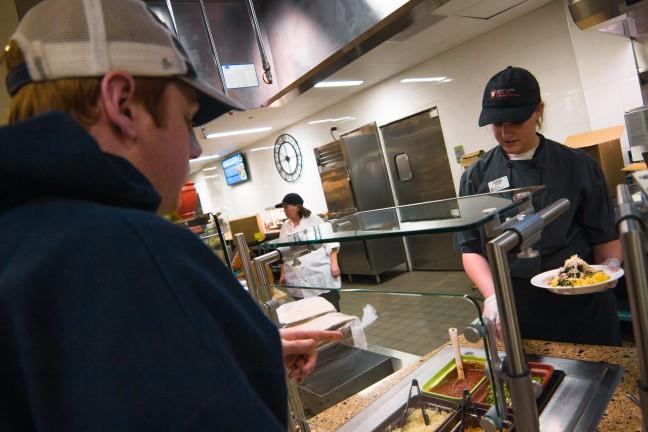With a continuously rising cost of attendance, many college students feel it necessary to get a job while in school. For University of Wisconsin sophomore Asher Bernards, he said the main reason why he decided to get a job in college was to pay for his own textbooks and food.
But, despite availability of jobs within the university, such as in dining halls or with the Wisconsin Union, many students opt for off-campus jobs in the private sector. In fact, the university has had trouble filling all of the student job positions over the past several years. In an interview with Isthmus, Wisconsin Union’s communication director Shauna Breneman commented that while they do employ around 1,750 students, there remain nearly 400 unfilled student positions.
This has not always been the case. Per Isthmus’ article, Brendon Dybdahl, a University Housing spokesperson, explains that during the recession in the late 2000s and early 2010s, they had a long waiting list of students looking for jobs, but as the economy has improved over the past several years, fewer and fewer students seem to be seeking out jobs with the university.
The cost of knowledge: Average UW student graduates with nearly $30,000 in loan debt
This is not necessarily because significantly fewer students are getting jobs in general — according to the National Center for Education Statistics, between 2010 and 2015, the percentage of full-time undergraduate students with jobs (on-campus or off-campus) only fluctuated by about 1 or 2 percent, meaning that the same numbers of students still want jobs, they just don’t necessarily want jobs with the university.
During the recession, job availability plummeted because many establishments were forced to freeze or reduce hiring, if they managed to stay in business at all. Because of this, students seeking jobs really only had one option: Apply to work within the university. But, as the economy grew and more positions became available in the private sector, students moved away from the university’s jobs, and toward those at businesses in the city of Madison. Clearly, many students view working for the university as a second choice, and given the option, would rather work off campus.
A living wage: UW student workers fight for higher compensation
UW sophomore Alexis Hilton, a server at a State Street restaurant, said “I chose to work off campus because there are more options for jobs and I could make more money working at a restaurant. It was also cool to have a mix of some coworkers that were students and some that were just residents of Madison.”
While UW sophomore Ellie Knoll worked on campus last year, she got a new job off campus this year.
“I chose to leave my on-campus job because this job provides better experience for my future career aspirations of working in the medical field, and it pays more too,” Knoll said.
UW junior Salvatore DiVita chose to work at a downtown Italian restaurant instead of in the dining halls because the low pay deterred him. Students have a variety of reasons for choosing to work off campus, but one common answer stands out: Off-campus jobs pay more.
In 2016, the University took a major step forward in hiking its starting student wage up to $9 per hour, from $7.25 per hour, which had been the starting wage since the federal minimum wage increase in July 2009. But, in 2016, the Dane County Board approved a plan that commits to raising minimum wage for county and contract employees to $12.50 per hour by the end of 2017, adding 50 cents each year to reach $15 per hour by 2022. This doesn’t necessarily require privately owned businesses to follow the same plan, but to remain competitive in the job market, many privately-owned businesses have also been increasing their wages, while the university’s starting wage remains stagnant below $10 per hour.
Additionally, even though the difference in pay is only a few dollars, you’d be hard-pressed to find a convincing argument that cleaning dishes at Gordon is a more desirable job than serving at a downtown restaurant where you could score some leftover food, or working in a boutique on State Street. Given that Madison is not a very big city, convenience also isn’t really a game changer — it might be just a five minute walk to Memorial Union, but also only be a seven minute walk to a coffee shop on State Street. Simply put, the university pays less money for less desirable jobs.
City finance committee votes to increase funding for youth employment program
If the university wants to fill these student positions, it needs to consider how it might incentivize student employees. The best way to do this is to follow suit with Dane County and continue to raise student wages. According to UW’s 2016-17 Data Digest, cost of attendance has increased by an average of 3.7 percent per year, since 2009. The wage increase in 2016 only brings the annualized increase in wages up to around 2.4 percent.
If the university is going to increase cost of attendance at a greater rate than other Big Ten universities (average annualized increase of tuition at these schools is around 2.7 percent) without paying higher wages for student workers, that increase looks more like 4 percent for a student paying for 15 percent of their expenses. The unfilled job rate is telling us students are underpaid. It’s time for the university to stop exploiting students who work just to get by.
Cait Gibbons ([email protected]) is a sophomore majoring in mathematics.





















